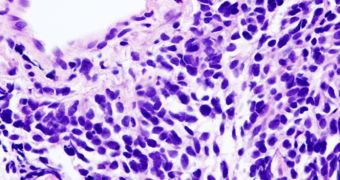A study conducted by investigators at the University of California in Los Angeles (UCLA) suggests that an experimental drug used successfully for treating melanoma (skin cancer) may have similarly-positive effects of some types of lung cancer.
The finding could open the way for the development of innovative cancer treatments that increase patients' survivability.
The effectiveness of the substance, called MK-3475, was assessed in a Phase 1B study on human patients, Dr. Edward Garon announced at the World Conference of Lung Cancer, held in Sydney, Australia, on October 29. Garon is the director of thoracic oncology at the UCLA Jonsson Comprehensive Cancer Center (JCCC).
According to the team, the new drug was used on patients suffering from non-small cell lung cancer, the most common type of cancer in the world. Each of the 38 participants was given a dose of the chemical once every three weeks. The group was selected from patients who were not responding to standard treatments for this type of cancer.
Statistically, one in four participants responded positively to the drug. The medial overall survival rate for the group was 51 weeks. In patients whose cancers responded to the treatment, lung cancer tumors shrank, and their odds for survivability improved significantly.
Encouraged by these results, UCLA scientists have already begun putting together a new test group, this time for a Phase2/3 trial that will compare the effects of different doses of the drug to the effects of regular chemotherapy. Studies such as this will enable oncologists to create and refine a course of treatment that will help millions of people around the world.
The team also determined that the most common side-effects to MK-3475 were rash, skin itching, fatigue, diarrhea and joint pain. Fortunately, these manifestations were all of low or very low intensity.
“These are early results, but we are very encouraged by what we've seen so far with this drug. Lung cancer patients who have disease that has grown after two prior therapies do not have many options, and we are cautiously optimistic that this might be a treatment that improves their chances in the future,” Garon said at the conference.

 14 DAY TRIAL //
14 DAY TRIAL //